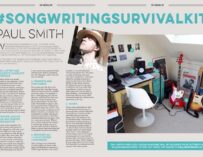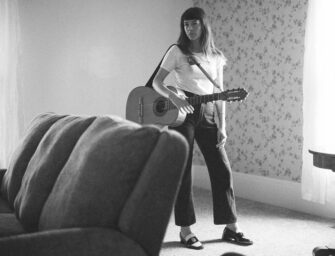
“This time we wanted to try something different” – Field Music’s Peter (left) and David Brewis
We caught up with a Sunderland-based songwriter who, along with his brother, has been the driving force behind Field Music
It should come as no surprise that the release of Field Music’s latest album has been met with huge praise. Along with their occasional bandmates, Sunderland siblings David and Peter Brewis have been wowing fans and critics alike since their self-titled debut album came out in 2005. Their intelligent and experimental art-pop has evolved over six albums, including the soundtrack Music For Drifters resulting in Commontime, their funkiest offering yet.
As well as his work with Field Music, Peter has also formed alt-rock side project The Week That Was and worked with Maximo Park’s Paul Smith on the 2014 album Frozen By Sight, a complex collection of chamber music built around Smith’s travel writing.
Songwriting caught up with Peter to discuss the process of writing the new Field Music album and to delve a little deeper into the working relationship with his brother…

Field Music ‘Commontime’ album cover
“The people that are around us tend to be the biggest inspirations. David and I have both become fathers in the last few years so that’s had a big impact on how we see the world. It’s also had an impact on the music I’ve been listening to. I tend to do most of my listening in the van with my son choosing what goes on the CD player. It’s been heavy on the Beatles, Bowie and Fleetwood Mac – Peter Green’s and the Buckingham-Nicks era. He’s also keen on Thelonious Monk for some reason.”
Were you listening to anything in particular when making the album, which helped shape its sound?
“Other than my son’s van playlists, David and I had both been getting into some funkier stuff. Prince, of course, and the first four Sly and the Family Stone albums. We’d also been listening to a lot of the recent African funk and jazz CD reissues while we were on tour with SLUG.”
Did you both make a conscious decision to sound poppier than ever?
“It was conscious to try a slightly cleaner sound and to try writing some songs with more conventional structures. On previous records we pushed the modular aspect of our composition, but this time we wanted to try something different.”
[cc_blockquote_right] MORE OFTEN THAN NOT, ONE OF US WILL HAVE A FAIRLY FULLY FORMED IDEA [/cc_blockquote_right]
So the style of writing differed quite a lot from the Music For Drifters soundtrack?
“The two things are as different as anything we’ve ever done. The Drifters soundtrack was very much a ‘band playing in a room’ process. It was semi-improvised and the structures, rhythm and mood were dictated by the film. It had absolutely no commercial considerations either. It was a commission where we could do whatever we fancied. We wanted to embrace the improv-rock side of the band. Commontime was probably a reaction against that – we wanted to see what we could do as a song-orientated band.”
And did you learn anything when working with Paul Smith on Frozen By Sight which you’ve incorporated into your own writing?
“I worked very hard on my string arrangements. They were integral to those songs so I had to expand my vocabulary. That’s made the string writing on the new album a bit better I hope. I was also really interested in how Paul used these words, which weren’t necessarily written as lyrics, about seemingly mundane, everyday things into something quite lyrical and beautiful. I think that’s had an influence on me.”
What influence did the other members of the band have this time?
“David really wanted to write some crazy bass parts for Andrew [Moore], who plays with us live. Just to amuse/annoy him! Liz [Corney] joined the band as the album was getting finished so we got her to sing on a few tracks. It’s mainly just David and me in the studio and we have a bit of a rule not to worry about how we can play the stuff live. That rule gets bent fairly often.”
Is there a driving force behind Field Music?
“David and I are ambitious and curious. I think we still want to make the sort of music that we don’t hear but would like to.”
Do you find it easy to work together?
“Yes. We have our own ideas and we can be very picky about things. But, we have a good system to decide who’s in charge. Whoever wrote it initially, has veto.”

Field Music’s David (left) and Peter Brewis: “We want to surprise each other, make each other laugh.” Pic: Andy Martin
Is it a relationship that enjoys creative tension or is it more harmonious than that?
“It’s a bit of both. Friendly competition sometimes; fierce collaboration at others. We want to surprise each other, make each other laugh and make each other feel like we’re doing something good.”
How critical are you of each other?
“We’re not very critical of each other. We know how critical we are of ourselves and that’s enough for both of us.”
Do you miss writing with each other when you’re working on other projects?
“Probably not at the beginning! We often need some time to be in charge of our thing. Having said that, we almost always end up playing in each other’s bands.”
Are there any other sibling writing partners that you’ve paid particular attention to over the years?
[cc_blockquote_right] MY EARS ARE GETTING A LITTLE TIRED OF ANTHEMIC, EMOTIONAL CHORUSES [/cc_blockquote_right]
“None that I can think of.”
How does a Field Music song tend to start? Will you write together from scratch or will one of you have the initial idea?
“We never write together from scratch. More often than not, one of us will have a fairly fully formed idea and it’ll just need a bit of tweaking when we’re in the studio. David and I both keep notebooks of lyrical ideas and music ideas on Dictaphones too. I can’t speak for David, but I tend to start by messing around on a piano or guitar, trying not to play the same old chords. I was quite taken with the image of Igor Stravinsky coming up with ideas by turning away from the keyboard and then almost randomly bouncing his hands on the keys to hear what sort of combinations would happen.”
What other instruments do you use when writing a song?
“Anything I can get something out of. Piano, guitar, synth, bass or sometimes just singing. I’ve even initiated a few songs with drum ideas.”
What’s the secret to writing a memorable chorus?
“I’m not sure I would know. I would have thought it’d have something to do with repetition, but I’ve begun to think that the search for great choruses is having a negative effect on pop music. My ears are getting a little tired of anthemic, emotional choruses and they seem to be ubiquitous. I kind of tried it on Trouble At The Lights but it bored me to tears and I had to weird it up a bit. Some of my favourite songs – even some hits – don’t have choruses at all.”
Do you feel differently about creating and releasing music in 2016 than you did in 2005?
“I still feel very excited by it and I still feel we’re getting better. I can’t remember exactly how I felt back in 2005 but it must be different. I had a lot more time on my hands back then and a lot less responsibility.”
What do you think is the secret to your longevity as a band?
“I don’t know. Maybe it’s because we’re not really a band and we don’t have the same pressures as one. David and I can take breaks from each other and when we want to do something together we can. We’re self-sufficient to an extent too. We have a little studio and we can work it, and we can both drive the van to gigs. And, like I said before, we’ve always been ambitious about what sort of music we want to make. We’ve still got a lot to do!”
Do you have any big ambitions that you’re yet to realise?
“The big ambitions for me are to continue to see what we can do with music. Sometimes I feel we’ve only just started.”
Interview: Duncan Haskell
Commontime is out now through Memphis Industries and Field Music are currently on tour in the UK. Check out their website for more information field-music.co.uk



































Related Articles